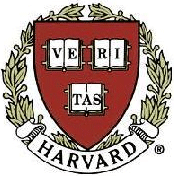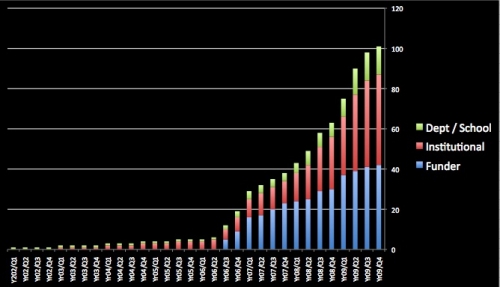Friday, October 30. 2009
 ROARMAP
OA Self-Archiving Mandate:
Madurai Kamaraj University (INDIA)
Institution's OA Eprint Archives:
[growth data] http://eprints.bicmku.in
eprints repository for School of Biotechnology from July 2009
 Institution's/Department's OA Self-Archiving Policy: Institution's/Department's OA Self-Archiving Policy:
IDOA - immediate deposit and optional access
Added by: S. Krishnaswamy (Senior Professor, Nodal person for open access in MKU) mkukrishna AT gmail.com on 29 Oct 2009
Wednesday, October 28. 2009
 Professor Robert Darnton, Carl H. Pforzheimer University Professor and Director of the University Library at Harvard has done a JISC podcast interview about Harvard's historic success in achieving faculty consensus on the adoption of an Open Access (OA) mandate in a number of Harvard's faculties.
Professor Darnton's podcast is highly recommended. Just a few (minor) points of clarification:
1. Public Access. Although worldwide public access to universities' refereed research output is a desirable and welcome side-benefit of OA and OA mandates, a lot of research is, as Prof. Darnton points out, " esoteric," intended for and of direct interest only to specialists. It is the scholarly and scientific research progress that this maximized peer-to-peer access makes possible that confers the primary public benefit of OA. Pubic access and student/teacher access are secondary bonuses.
2. NIH Compliance Rate. Prof. Darnton referred to the very low ( 4%) rate of compliance with the NIH public access policy: That figure refers to the compliance rate during the first two years, when the NIH policy was merely a request and not a requirement. Once the NIH policy was upgraded to a mandate, similar to Harvard's, the compliance rate rose to 60% and is still climbing. (Achieving consensus on mandate adoption and achieving compliance with mandate requirements are not the same issue; nor is the question of which mandate to adopt.)
3. Covering Gold OA Publication Fees. As Prof. Darnton notes, the Harvard mandate (a "Green OA" mandate for Harvard authors to deposit -- in Harvard's OA Institutional Repository -- all their peer-reviewed final drafts of articles, published in any journal, whether a conventional subscription journal or a "Gold OA" journal) is about providing OA to Harvard's research output today, not about converting journals to Gold OA -- although Prof. Darnton anticipates that in perhaps a decade this may happen too. He and Professor Stuart Shieber, the architect of Harvard's successful consensus on adoption, both feel that it helps win author consensus and compliance -- to reassure those authors who may be worried about the future viability of their preferred journals -- to make some funds available to pay for Gold OA publication fees, should that be necessary. (This policy is just fine for a university, like Harvard, that has already mandated Green OA, but if Harvard's example is to be followed, universities should make sure first to mandate Green, rather than only offering to subsidize Gold pre-emptively.)
4. Journal Article Output vs. Book Output. The Harvard OA mandate covers journal article output, not book output. It would of course be a welcome outcome if eventually OA mandates made it possible for universities to save money on journal subscriptions, which could then be used to purchase books. But it must be clearly understood that not only does the OA mandate not touch books, but the economics of book publication are very different from the economics of journal publication, so even an eventual universal transition to Gold OA journal publication does not entail a transition to Gold OA book publication.
5. Compliance Rate With Opt-Out Mandates. It is important to understand also that the compliance rate for OA mandates with opt-out options, like Harvard's, compared to no-opt-out mandates is not yet known (or reported). (My own suggestion would still be that the best model for an OA mandate is the Immediate-Deposit/Optional-Access [ID/OA] mandate, which allows opt-out from OA, as the Harvard mandate does, but not from immediate deposit itself; ID/OA allows the institutional repository's "email eprint request" button to tide over user access needs during any publisher embargo period by providing "Almost OA" to Closed-Access deposits [what Prof. Darnton called "dark" deposits] during any publisher embargo.)
6. Proxy Deposit By Publishers. It is splendid that Harvard's Office for Scholarly Communication is providing help and support for Harvard authors in understanding and complying with Harvard's mandate, including proxy depositing of papers on authors' behalf. I am not so sure it is a good idea, though, to encourage the option of having the publisher do the Harvard author's deposit by proxy on the author's behalf (after an embargo of the publisher's choosing) as a means of complying with the mandate. Best to keep that in the hands of the author and his own institutional assigns...
Stevan Harnad
American Scientist Open Access Forum
Tuesday, October 27. 2009
 Mandates #99-#101 were registered ROARMAP just before OA week. During the week, there were three more:
#102 Seinäjoki University (Finland, Institutional)
#103 Universidad de Los Andes (Venezuela, Institutional)
#104 Trinity University (US, Institutional)
If your institution or funder has one that is not yet registered in ROARMAP, please do register it now!
Wednesday, October 21. 2009
 With every good intention, Jason Baird Jackson -- in " Getting Yourself Out of the Business in Five Easy Steps" is giving the wrong advice on Open Access, recommending a strategy that has not only been tried and has failed and been superseded already, but a strategy that, with some reflection, could have been seen to be wrong-headed without even having to be tried: • Choose not to submit scholarly journal articles or other works to publications owned by for-profit firms.
• Say no, when asked to undertake peer-review work on a book or article manuscript that has been submitted for publication by a for-profit publisher or a journal under the control of a commercial publisher.
• Do not seek or accept the editorship of a journal owned or under the control of a commercial publisher.
• Do not take on the role of series editor for a book series being published by a for-profit publisher.
• Turn down invitations to join the editorial boards of commercially published journals or book series. In the year 2000, 34,000 biological researchers worldwide signed a boycott threat to stop publishing in and refereeing for their journals if those journals did not provide (what we would now call) Open Access (OA) to their articles.
Their boycott threat was ignored by the publishers of the journals, of course, because it was obvious to them if not to the researchers that the researchers had no viable alternative. And of course the researchers did not make good on their boycott threat when their journals failed to comply.
The (likewise well-intentioned) activists who had launched the boycott threat then turned to another strategy: They launched the excellent PLoS journals (now celebrating their 5th anniversary) to prove that there could be viable OA journals of the highest quality. The experiment was a great success, and many more OA journals have since spawned, some of them (such as the BMC -- now Springer -- journals) of a quality comparable to conventional journals, some not.
But what also became apparent from the (now 9-year) exercise was that providing OA by creating new journals, persuading authors to publish in them instead of in their established journals, with their track-records for quality, and finding the funds to pay for the author publication fees that many of the OA journals had to charge (since they could no longer make ends meet with subscriptions) was a very slow and uncertain process.
There are at least 25,000 peer-reviewed journals published annually today, including a core of perhaps 5000 journals that constitute the top 20% of the journals in each field, the ones that most authors want to publish in, and most users want to access and use (and cite).
There are now about 5000 OA journals too, likewise about 20%, but most -- unlike the PLoS journals (and perhaps the BMC/Springer and Hindawi journals) -- are far from being among the top 20% of journals. Hence most researchers in 2009 face much the same problem that the signatories of the 2000 PLoS boycott threat faced in 2000: For most researchers, it would mean a considerable sacrifice to renounce their preferred journals and publish instead in an OA journal: either (more often) OA journals with comparable quality standards do not exist, or their publication charges are a deterrent.
Yet ever since 2000 (and earlier) there has been no need for either threats or sacrifice by researchers in order to have OA to all of the planet's peer-reviewed research output. For those same researchers who were signing boycott threats that they could not carry out could instead have used those keystrokes to make their own peer-reviewed research OA, by depositing their final, peer-reviewed drafts in OA repositories as soon as they were accepted for publication, to make them freely accessible online to all would-be users webwide, rather than just to those whose institutions could afford to subscribe to the journals in which they were published.
Researchers could have made all their research OA spontaneously since at least 1994. They could have done it OAI-compliantly (interoperably) since at least 2000.
But most researchers did not make their own research OA in 1994, nor in 2000, and even now in 2009, they seem to prefer petitioning publishers for it, rather than providing it for themselves.
There is a solution (and researchers themselves have already revealed exactly what it was when they were surveyed). That solution is not more petitions and more waiting for publishers or journals to change their policies or their economics. It is for researchers' institutions and funders to mandate that their researchers provide OA to their own refereed research by depositing their final, peer-reviewed drafts in OA repositories as soon as they are accepted for publication, to make them freely accessible online to all would-be users webwide, rather than just to those whose institutions can afford to subscribe to the journals in which they were published.
I would like to suggest that Jason Jackson (and other well-meaning OA advocates) could do incomparably more for global OA by lobbying their own institutions (and funders) to adopt OA mandates than by launching more proposals to boycott publishers who decline to do what researchers can already do for themselves. (And meanwhile, they should deposit their articles spontaneously, even without a mandate.)
OA Week 2009 would be a good time for the worldwide research community to come to this realization at long last, and reach for the solution that has been within its grasp all along.
(P.S. The correlation between whether a journal is published by a for-profit publisher and whether it is an OA journal is at best a weak one. The American Chemical Society is one of the most regressive of journal publishers, and it is not-for-profit. Springer and Hindawi are both OA publisher and for-profit. But in any case, neither the problem nor the solution resides in publishers, for-profit or not. Both the problem and the solution is entirely in the hands of the research community, the providers of all research content, and it resides at the end of their fingertips.)
Stevan Harnad
American Scientist Open Access Forum
Tuesday, October 20. 2009
 Michael's Geist's article "Canadian Universities Too Closed Minded on Open Access" is timely and welcome, but it is nonspecific about just what it is that Canadian universities are closed minded about (or what they can do about it).
It's not about Open Access publishing (" Gold OA"). Those few Canadian universities that are journal publishers at all, are only very minor ones. The decision about whether and when (if ever) to convert to Open Access publishing is in the hands of the big international publishers (whose journals are also the ones to which access is most needed by authors and users, both in Canada and in the rest of the world).
Nor is Canadian universities making some of their scarce funds available to pay for Open Access publishing charges going to provide much Open Access either.
For Canada, Open Access is about providing Open Access to Canada's own research output, so that all potential users worldwide can access, use, apply and build on it, not just those whose universities can afford to subscribe to the journal in which it happens to be published -- and so that the findings of the Canadian researchers who did the research, and their universities, and the research itself, can receive the full usage and impact that they deserve.
The way to make all this happen is for Canadian universities to mandate that the final draft of every research article their researchers publish, regardless of which journal it is published in, must also be deposited in the university's Open Access Institutional Repositories, to make the research freely accessible to all users online (" Green OA").
That is what Canadian universities need to do in order to make all Canadian research output Open Access. That's what Harvard and Stanford and MIT (and 100 other universities and research funders worldwide -- but not Cornell, nor Athabasca nor York, but only the Library Department at University at Calgary) have already done.
If you want Canadian Universities to open their minds to Open Access, you have to know what to put in their minds -- and it's about what they need to mandate that their own researchers put in their own repositories.
Stevan Harnad
American Scientist Open Access Forum
Saturday, October 17. 2009
 With mandates 99-101 registered in ROARMAP, Green OA Self-Archiving Mandates have now passed the 100 mark -- seven years after they began, in 2002, with the very first one ( University of Southampton's School of Electronics and Computer Science). The pace has at last picked up, especially since Harvard's mandate(s) last year, since which the number has doubled.
#99 (funder, Sweden) Swedish Research Council
#100 (institution, UK) University of Salford
#101 (institution, US) National Center for Atmospheric Research (NCAR)
We will be celebrating the Salford mandate (because it is a milestone, the 100th) but stay tuned as there are rumors several more mandates will be announced during next week's Open Access Week.
If your institution or funder has one that is not yet registered in ROARMAP, please do register it now!

Tuesday, September 29. 2009
 Register your IR and policy in ROARMAP to track all institutions that require ETDs
Celebrate Open Access Week by registering your institutional repository (IR) and policy in ROARMAP to track all institutions that require ETDs worldwide. ROARMAP (Registry of Open Access Repository Material Archiving Policies), is a creation of open access activist Stevan Harnad, hosted by the folks at eprints. We invite everyone to register your IR and policy at http://www.eprints.org/openaccess/policysignup/
NDLTD Press Release
<><><><><><><><><><><><><><><><><>
John H. Hagen
Manager, WVU Institutional Repository Program / Coordinator, Electronic Thesis & Dissertation Program
Board Member, NDLTD
Co-Chair, ETD 2009 Symposium
WEST VIRGINIA UNIVERSITY LIBRARIES
Acquisitions Department
Wise Library, Room 2510
P.O. Box 6069 / 1549 University Ave.
Morgantown, WV 26506-6069
(304) 293-5267
http://www.wvu.edu/~thesis/
Friday, September 25. 2009
Wednesday, September 23. 2009
 From: Bernard Rentier
To: American Scientist Open Access Forum
Subject: Launch of EOS
An organisation that will be of interest to all rectors and vice-rectors-for-research is now ready to take off.
Enabling Open Scholarship (EOS) LAUNCHES NEW ORGANISATION FOR INSTITUTIONAL DIRECTORS WORLDWIDE
Liege, Belgium
23 September 2009
ENABLING OPEN SCHOLARSHIP (EOS), a new organisation for senior management in universities and research institutions, has been launched today.
The context in which EOS has been established is that of increasing interest from governments, funders and the research community itself in opening up the way research is carried out and communicated. This interest is complemented by new research practices and processes that can work effectively only in an open, collaborative environment.
As we rapidly approach 100 formal, mandatory, policies on Open Access from universities, research institutes and research funders a group of senior directors of universities and research institutes have come together to launch a new forum for the promotion of the principles and practices of open scholarship.
The aim of Enabling Open Scholarship (EOS) is to further the opening up of scholarship and research that we are now seeing as a natural part of ‘big science’ and through the growing interest from the research community in open access, open education, open science and open innovation. These, and other, 'open' approaches to scholarship are changing the way research and learning are done and will be performed in the future.
Enabling Open Scholarship (EOS) provides the higher education and research sectors around the world with information on developments and with advice and guidance on implementing policies and processes that encourage the opening up of scholarship. It also provides a forum for discussion and debate amongst its members and will be taking that discussion into the wider community.
EOS membership is for senior institutional managers who have an interest in — and wish to help develop thinking on — strategies for promoting open scholarship to the academy as a whole and to society at large.
The EOS website is a resource open to all. It provides background information, data and guidance material on open scholarship-related issues. In a limited access area, members can find announcements, news and discussions.
EOS offers an outreach service to universities and research institutes — whether members or not — that need help, advice, guidance or information on open scholarship issues. We do this through our website and also by providing information on an individual basis to institutions that need it.
The EOS board is composed of people who have personally designed or instigated the kinds of changes in their own institutions that herald the benefits of the open scholarly communication system of the future. Now this expertise is available for others to tap into.
The current EOS board comprises:• Bernard RENTIER (Chairman), Rector of the University of Liege, Belgium
• Tom COCHRANE, Deputy Vice Chancellor, Queensland University of Technology, Brisbane, Australia
• William DAR, Director General of the International Crops Research Institute for the Semi-Arid Tropics (ICRISAT), Hyderabad, India
• Stevan HARNAD, Canada Research Chair, Université du Québec à Montréal (UQAM), Montreal, Quebec & University of Southampton
• Keith JEFFERY, Director of IT and International Strategy at the Science & Technology Facilities Council, Swindon, UK
• Sijbolt NOORDA, President of VSNU, the Association of Dutch Research Universities
• Stuart SHIEBER, James O. Welch, Jr. and Virginia B. Welch Professor of Computer Science in the School of Engineering and Applied Sciences at Harvard University and Director of Harvard’s Office of Scholarly Communication
• Ian SIMPSON, Deputy Principal for Research and Knowledge Transfer, and Professor of Environmental Science, University of Stirling, UK
• Peter SUBER, Berkman Center for Internet & Society, Harvard University, Cambridge, USA
• John WILLINSKY, Khosla Family Professor of Education at Stanford University and director of the Public Knowledge Project at the University of British Columbia and Simon Fraser University, USA
• Alma SWAN (Convenor/Coordinateur), Director of Key Perspectives Ltd, Truro, UK “The world of research is changing and universities and other research-based institutions must drive the change, not sit back and let it happen. Having embarked upon implementing changes in thinking and practice at my own university, I want to encourage others in my position to join the discussion and help lead the way to a better future,” said Professor Bernard Rentier. “We will be reaching out to universities and research institutes across the world to invite them to play an active role in building better systems of scholarship for the future. EOS will provide the forum and the voice for the research community on open scholarship issues and represents a very valuable resource for those who want to join in this endeavour”.
“The benefits of open access and open scholarship have been clearly demonstrated for individuals, institutions and the public,” said Professor Keith Jeffery. “EOS will be there to provide information and guidance from those who have already had experience of making the changes needed.”
Dr William Dar said, "Open scholarship benefits the whole world's science, not just that of the western world. It enables the free flow of research information between north and south, east and west, helping research to progress much more effectively. EOS will be very valuable in advancing this process and improving the way science is carried out across the globe".
For more information visit the Enabling Open Scholarship website at:
http://www.openscholarship.org
or contact the convenor:
Dr Alma Swan
+44 1392 879702
info@openscholarship.org
Monday, September 21. 2009

SUMMARY: Universities need to commit to mandating Green OA self-archiving before committing to spend their scarce available funds to pay for Gold OA publishing. Most of the university's potential funds to pay Gold OA publishing fees are currently committed to paying their annual journal subscription fees, which are thereby covering the costs of publication already. Pre-emptively committing to pay Gold OA publication fees over and above paying subscription fees will only provide OA for a small fraction of a university's total research article output; Green OA mandates will provide OA for all of it. Journal subscriptions cannot be cancelled unless the journals' contents are otherwise accessible to a university's users. (In addition, the very same scarcity of funds that makes pre-emptive Gold OA payment for journal articles today premature and ineffectual also makes Gold OA payment for monographs unaffordable, because the university funds already committed to journal subscriptions today are making even the purchase of a single print copy of incoming monographs for the library prohibitive, let alone making Gold OA publication fees for outgoing monographs affordable.) Universal Green OA mandates will make the final peer-reviewed drafts of all journal articles freely accessible to all would-be users online, thereby not only providing universal OA, but opening the doors to an eventual transition to universal Gold OA if and when universities then go on to cancel subscriptions, releasing those committed funds to pay the publishing costs of Gold OA.
On 19-Sep-09, at 10:17 PM, Sandy Thatcher wrote (in liblicense): ST: "I applaud these five universities for putting their money where their mouth is. This will help obviate one of the perils of the Green OA system that Stevan Harnad advocates, viz., the proliferation of different versions of articles as publishers allow peer-reviewed but unedited articles to be posted while reserving the right to distribute the final versions themselves exclusively." "Two of the five universities ( Harvard and MIT) who have so far signed the Compact for Open Access Publishing Equity (COPE) are to be applauded -- for putting their total refereed research output where their mouth is by mandating that it must all be made OA (through Green OA self-archiving) today.
Sandy Thatcher can rest assured that the many access-denied would-be users worldwide who would otherwise not have had access to a particular item of that refereed research, because their institutions could not afford subscription access to that item, do not feel imperiled but "empowered" by the fact that they now have access to its self-archived final refereed draft (though not the publisher's PDF) rather than no access at all. Research progress -- and OA -- are about content, not form.
Nor do those access-denied would-be users care one bit about " version proliferation." What they care about is access proliferation, so they can get on with their research using all the relevant refereed research there is rather than just the fraction of it that their institutions can afford to subscribe to today.
But there is nothing whatsoever to applaud in the case of the three out of five universities ( Cornell, Dartmouth and Berkeley) who have signed COPE but failed to put their total research output where either their mouth or their money is: They have committed to use whatever spare cash they have available today to pay "equitable" Gold OA publishing fees for the small fraction of their total research output for which Gold OA is available and affordable today, while failing to mandate Green OA self-archiving for all the rest.
Nor is this bad example to other universities -- of unnecessarily committing scarce cash to pay for Gold OA for a token subset of their research output without the cost-free, necessary, urgent and long overdue provision of Green OA to all the rest of their research output -- to be applauded or welcomed, for if followed, it will just serve to keep delaying OA still longer, instead of reaching for what is already within the university community's grasp today.
The reason universities are cash-strapped and can only afford to buy Gold OA for a tiny fraction of their total refereed research output is that their cash is currently committed to journal subscriptions that are providing whatever access they can afford for their own users today. Those subscriptions are also paying the full cost of peer-reviewed publication for most research output today.
Universities committing to spend still more cash, for Gold OA, over and above the cash they are already spending on subscriptions, amounts to a token, a symbolic pittance, insofar as OA itself is concerned. It provides OA for a small fraction of a university's total research output at a high extra cost, unnecessarily, while leaving users access-denied for all the rest, instead of mandating Green OA self-archiving for all of the university's research output, at no extra cost.
Nor can the cash that universities are committing to pay for subscriptions (and hence publication) today be liberated, through individual cancellations, to pay instead for Gold OA -- as long as the necessary content that ongoing subscriptions are buying in for each university's own users is not yet otherwise accessible to those users.
What the reader who is thinking reflectively rather than just reflexively applauding COPE will realize at once is that the only realistic way that the world's 10,000 individual universities can liberate their current subscription funds to pay for a transition to universal Gold OA is if universities first provide universal OA to their total research output. The means of providing this universal OA today is through the universal adoption of Green OA self-archiving mandates by most or all universities, not by by committing scarce surplus cash toward paying pre-emptively for Gold OA for some small fraction of each university's total research output.
Provide OA Unto Others As You Would Have Them Provide OA Unto You:
Charity begins at home, with cost-free mandates to provide Green OA to each university's own total refereed research output, not with expensive, unnecessary and ineffectual gestures like COPE, which merely serve to mask and paper over the already long overdue need to mandate Green OA.
See: "Please Commit To Providing Green OA Before Committing To Pay For Gold OA"
"Fund Gold OA Only AFTER Mandating Green OA, Not INSTEAD"
ST: "But by all rights OA should apply to monographs, too. It makes no intellectual sense to isolate book-length works in print form in a few hundred libraries while making journal literature on the same subjects accessible worldwide for free. So, when will these universities, and others, step up to the plate and pay author fees for monographs, too?" Step up to the plate with author fees for monographs: sure enough, but where is the requisite cash supposed to come from?
Maybe if (1) the worldwide university community has the sense to do what is the very first urgent priority -- to mandate Green OA self-archiving for the refereed final drafts of all their research article output today -- then the resultant universal Green OA will eventually induce (2) the subscription cancellations, downsizing and transition to universal Gold OA publication for refereed research journal articles at "equitable" prices, paid for out of the windfall savings from the subscription cancellations.
Then this in turn might (3) leave some left-over windfall savings to pay for Gold OA for monographs too.
But this certainly won't be possible as long as universities lack even the cash to buy in print monographs for their libraries, as they do today, because the potential funds to pay for them are still tied up in paying for their journal subscriptions...
Having said all this so many times before, all I can offer is clichés: Charity begins at home. First things first. Don't put the cart before the horse. Keep your eye on the ball. Don't build (golden) castles in Spain...
Your weary archivangelist,
Stevan Harnad
|


 Professor
Professor  Mandates #99-#101 were registered
Mandates #99-#101 were registered  Michael's Geist's article
Michael's Geist's article  With mandates 99-101 registered in
With mandates 99-101 registered in 






